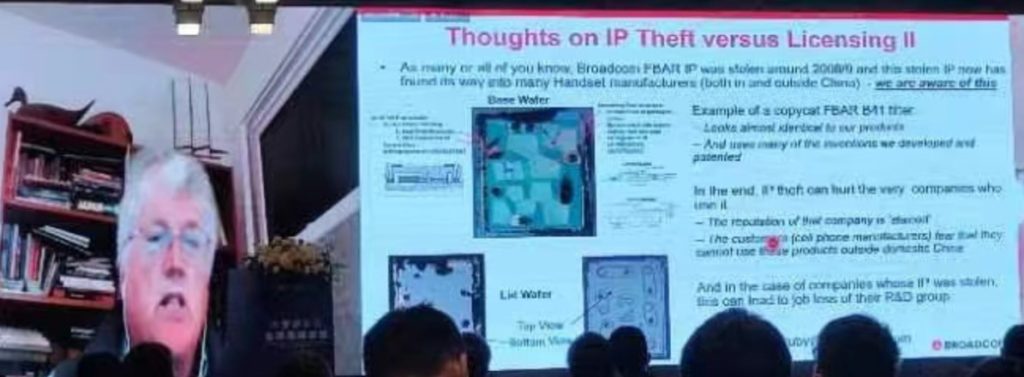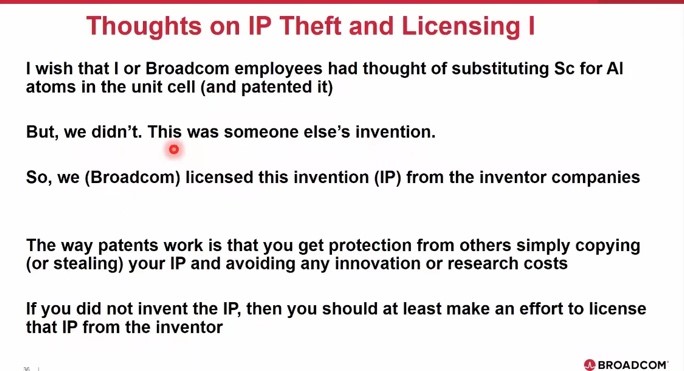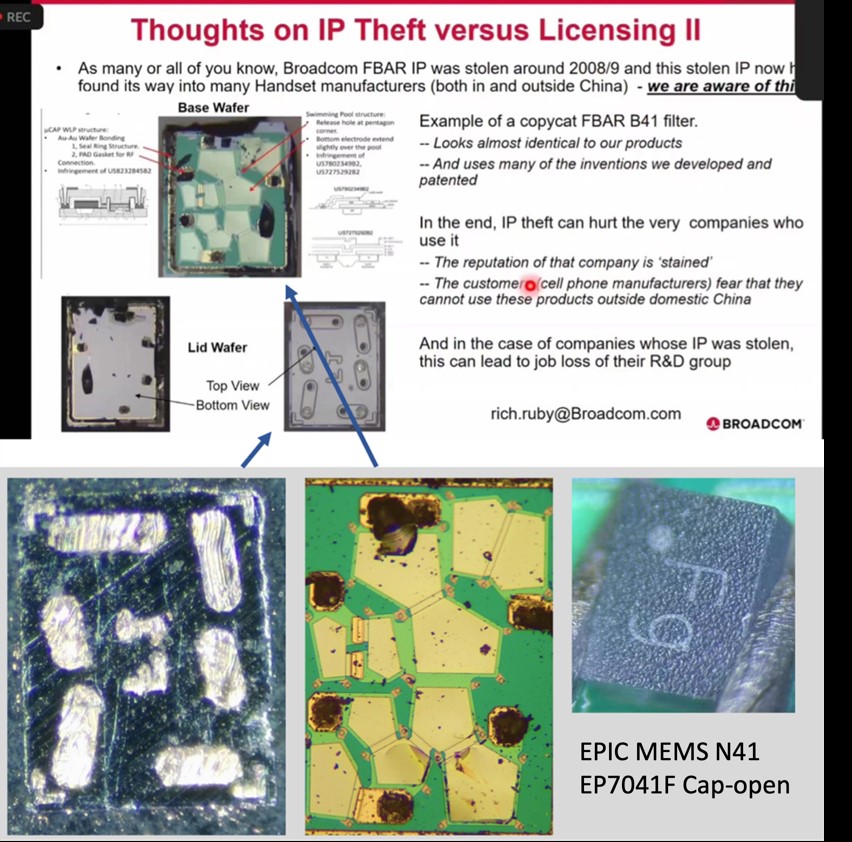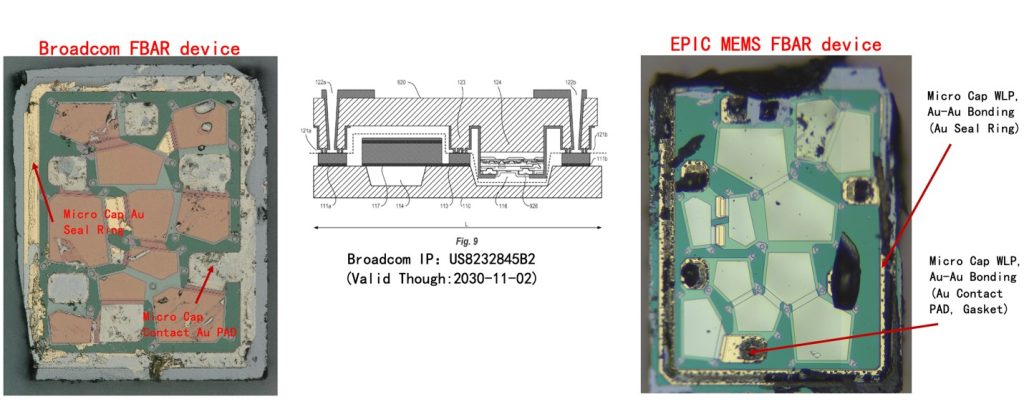IP infringement have long been a problem for business. There is almost this tendency of incumbents being disrupted by copycats. Despite intellectual property laws, patent filings and market dominance, copycats find ways to steal and pose an existential threat to every economy.
The monetary principle, Gresham’s law, states that “bad money drives out good”. The same principle applies to science and technology. Avoiding research cost, copycat drives out innovations and motivates companies to be opportunistic.
On Oct 29, a newfound copycat in semiconductor industry, EPIC MEMS (Kaiyuan Communication Technology Co. Ltd.), is being reported on the International Workshop on Acoustic Wave Devices for Future Communication. Dr. Rich Ruby, Direct of Technology at Broadcom, presented solid evidence of this newfound infringement.

(Photo: Dr. Rich Ruby’s Panel at the 2022 International Workshop on Acoustic Wave Devices for Future Communication)
“I wish that I or Broadcom employees had thought of substituting Sc for Al atoms in the unit cell (and patented it),” quoted by Dr. Rich Ruby, in a global conference. “The way patents work is that you get protection from others simply copying (or stealing) your IP and avoiding any innovation or research cost.”
Dr. Rich Ruby has made major contributions to the development with innovations centered on the acoustic properties, manufacturability, and the packaging of FBAR filters and duplexers. He commercialized the first FBAR duplexers HPMD7901 and the 7904 back in 2001–2003. He has over 80 patents and has given numerous invited papers. Dr. Ruby was an Agilent Fellow in 2002 and holds that title as well as Director of Technology at Broadcom. He was a recipient of the Barney Oliver Prize, the Bill Hewlett Award, and the CB Sawyer Award for his work on FBAR technology, and the IAP Prize for “Industrial Applications of Physics.”
Because of Dr. Ruby’s research efforts in decades, people can enjoy the next generation of skyrocketing data rates.
It has been almost 10 years after the FBAR technology being stolen for the first time by a group of copycats and put into massive production and attempt to drive out businesses of Broadcom. In 2015, Broadcom put the first group of copycats into lawsuit as economic espionage to protect its damages. The case can be found from Department of Justice.
“As many or all of you know, Broadcom FBAR IP was stolen around 2008/9 and this stolen IP now has found its way into many Handset manufactures,” quoted by Dr. Rich Ruby. “We are aware of this.”

(Photo: Dr. Rich Ruby’s Panel at the 2022 International Workshop on Acoustic Wave Devices for Future Communication)
Dr. Ruby displayed a photo example of the newfound copycat FBAR 41 filter. “[It] looks almost identical to our product and uses many of the inventions we developed and patented,” said Dr. Rich Ruby. “In the end, IP theft can hurt very companies who use it…and in the case of companies whose IP was stolen, this can lead to job loss of their R&D group.”
Industry experts discovered that the displayed FBAR 41 filter comes from a startup company EPIC MEMS and provided in-depth comparison with the cap-opened EPIC MEMS EP7041 filter chip.

(Photo: EPIC MEMS Filter Chip Decap)
Solid evidence of the IP infringement was unveiled from multiple research labs after the announcement of this newfound copycat EPIC MEMS. Dr. Ruby highlighted that the reputation of brands who use filter chips originated from stolen IP will be stained and rejected from the global market.

(Photo: Broadcom FBAR and EPIC MEMS FBAR comparison)
Mobile phones, pad computers and other devices using EPIC MEMS filter chips infringed Broadcom patents is at risk of facing lawsuit and might lead to market withdrawals.
However, based on recent public capital raising materials from EPIC MEMS, the problematic filter chip has been claimed to get delivered to Samsung and to the market.
Beyond everyone’s expectation, the copycat EPIC MEMS published an announcement in response to Dr. Ruby’s panel, “we took initiative designed and developed the technology.” The copycat company questioned credential of the conference and highlighted its expertise in research and development. Without apology for the IP infringement, the president of the copycat publicly claimed that the stolen FBAR technology from Broadcom is, in fact, self-developed and not belong to Broadcom.
According to the public record, in March 2021, EPIC MEMS completed its Series A round of financing at US$45 million. “The investment needed to make FBAR is large and not taken lightly. Also, thousands of knowhows to fine tune the yield,” experts from the conference commented after the panel. The fabrication process is not easy and took Dr. Ruby decades to finally put into massive productions. At the end of the conference panel, Dr. Ruby highlighted to audiences, “Stealing should not be proud of.” IP Infringement should be stopped in every economy.